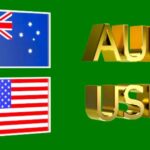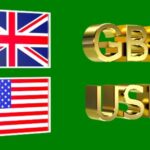What’s Happening?
The British Pound Sterling (GBP) is climbing steadily against the US Dollar (USD), reaching near 1.2850 in recent trading. The reason? Investors are starting to get nervous that the United States may be headed for a recession—a period of economic decline. This fear is making traders sell off the US Dollar and look for safer or more stable currencies, including the Pound.
Meanwhile, US-China trade tensions are heating up again. On Tuesday, President Trump hiked tariffs on Chinese imports to a whopping 104%, after China retaliated with its own tariff increases. This tit-for-tat trade battle is spooking the markets, as it could damage global trade and economic stability.
US Dollar is under pressure due to multiple negative signals:
Trade War Escalation: A full-blown tariff war between the world’s two biggest economies is bad for global trade and business confidence.
Recession Worries: As trade slows and tensions rise, economists believe the US could slip into a recession this year.
Rate Cut Bets: With all this economic uncertainty, investors are betting that the US central bank—the Federal Reserve—might cut interest rates to support the economy.
The US Dollar Index (DXY), which measures the Dollar’s strength against a basket of six major currencies, has dropped to near 102.00, showing just how much confidence is fading.
Pound Gets a Lift… But It’s Not All Good News
Even though the Pound is rising for now, the outlook for the UK economy is far from rosy. Deutsche Bank analysts believe the Bank of England (BoE) may have to slash interest rates by 50 basis points (0.50%) in May. That’s double the typical rate change and suggests real concern over the UK’s economic health.
Why would the BoE do this?
Financial conditions have become tighter, making it harder for businesses and consumers to borrow money.
Labor market worries are rising, with signs that job growth may be weakening.
These are all red flags that could justify an aggressive interest rate cut to keep the economy moving.
Global Risks Rising: A Broader Economic Chill
The trade war isn’t just a problem for the US and China—it’s a global concern. If China, the world’s manufacturing hub, can’t sell as much to the US, it will look for new markets, possibly flooding Europe and other regions with cheaper goods. That could trigger a price war, and Europe—already struggling with weak growth—may not be able to handle it well.
JPMorgan analysts warn that this level of trade tension could actually push the entire world economy into a recession.
What’s Coming Up This Week?
US CPI Data (Thursday): This inflation report will show whether prices are rising or cooling off. A high number could make the Fed hesitate to cut rates, while a low number will boost rate cut bets.
FOMC Minutes (Wednesday): The detailed minutes from the Federal Reserve’s last meeting will be released. Investors will study them for hints about how worried the Fed is about the economy.
UK GDP and Factory Data (Friday): These numbers will show how the UK economy performed in February. A small growth of 0.1% is expected, but any surprise—positive or negative—could shake markets.
Key Takeaways
The Pound is climbing as the Dollar weakens on fears of a US recession.
US-China trade tensions are rising fast, with Trump hiking tariffs to 104%.
Traders expect the Federal Reserve might cut rates soon to fight recession risks.
Deutsche Bank sees the Bank of England making a rare 0.50% rate cut in May.
Global recession fears are growing due to protectionist trade policies.









